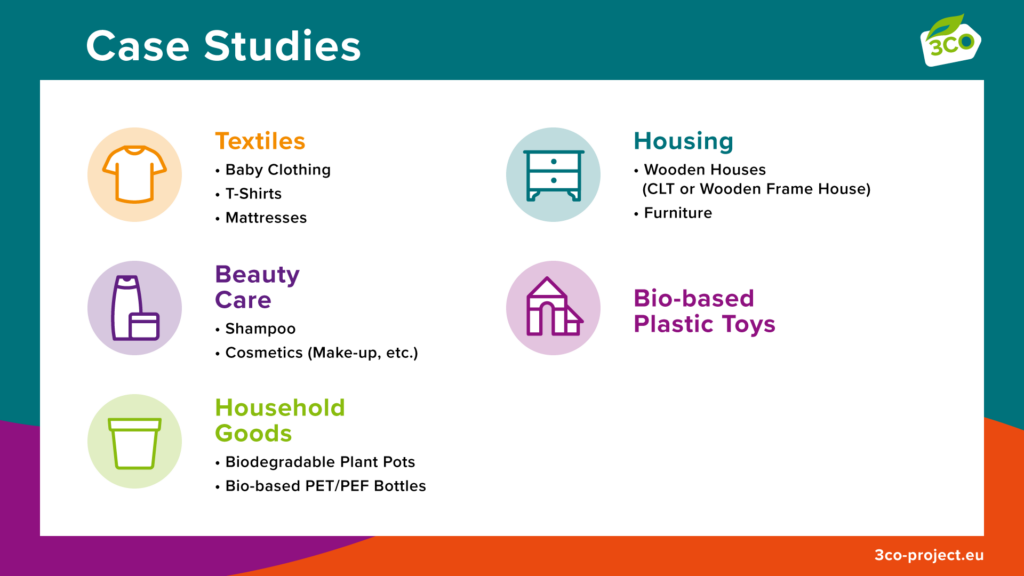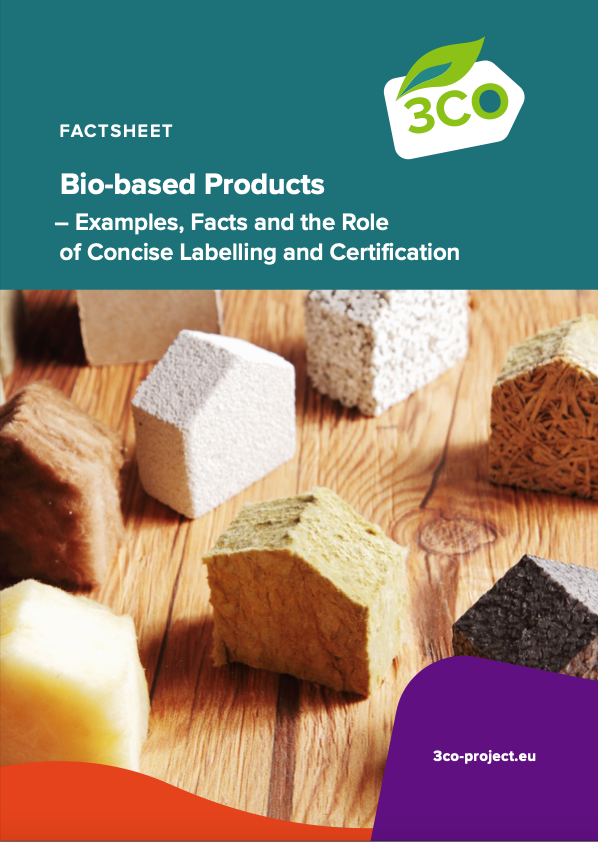Bio-based products (BBPs) are gaining popularity as consumers are increasingly aware of the climate impact caused by CO₂ emissions related to extraction and use of fossil resources in material and product manufacturing. BBPs are often more sustainable than conventional fossil-based products as they reduce the dependence on fossil carbon and promote the shift towards a circular economy.
Still, BBPs are subject to misconceptions that can confuse consumers and hinder sustainable purchasing decisions. To address this issue and support sustainable consumer choices, trustworthy labelling and certification based on robust sustainability claims play a crucial role. By providing transparent, clear and reliable information on a products sustainability performance, product-labels can successfully counteract greenwashing and increase consumer trust.
The recent factsheet explains the advantages of BBPs for mitigation of climate change, highlights the relevance of concise labelling and certification to support consumers in making sustainable purchasing decisions. It also provides an overview of key EU-regulations supporting BBPs and the EU bioeconomy. This factsheet is a valuable resouce for stakeholders aiming to foster the adoption of BBPs for a more sustainable future.
Examples for BBPs in the 3-CO Case Studies
BBPs offer a wide range of applications, from packaging materials and textiles to household cleaners and personal care items. While many BBPs are readily identifiable, supermarket-shelves hold plenty of lesser-known products of biological origin that cannot be recognised at first glance, such as bio-based plastics. The factsheet offers an exemplary list of such bio-based products within the ten value-chains considered in the 3-CO project.

Highlighting Facts on BBPs
Bio-based solutions offer significant sustainability benefits over their fossil-based counterparts, including reduced dependence on fossil carbon and lower greenhouse gas emissions per product. The factsheet elaborates on these benefits and debunks common misconceptions about BBPs:
- Increasing availability and affordability: BBPs are becoming more available and prices are decreasing.
- Durability and performance: BBPs often match or exceed the quality and longevity of conventional products.
- Minimal land use impact: BBPs do not consume much agricultural land.
- High safety standards: BBPs undergo thorough monitoring and testing to ensure safety.
- Biodegradability: Some BBPs offer the additional benefit of biodegradability, though this is not a universal characteristic.
- No competition with food and feed production.
By understanding the facts about BBPs, consumers and industries can make informed choices that contribute to environmental sustainability and economic development.
Switching to renewable BBPs is a crucial step towards a more sustainable national and
international bioeconomy that also is independent from fossil resources from outside the EU.
The full factsheet can be accessed here: https://3co-project.eu/wp-content/uploads/2025/02/25-02-25_3co-factsheet_bio-based-products_en_web.pdf
Support for Consumers
Within 3-CO, a mobile app was developed in order to support consumers to make eco-conscious purchasing decision. This application helps consumers understand the environmental impact of a BBP by analysing the labels and certifications displayed on its packaging. By making use of the app’s smart scanning technology in-shop, real-time information on eco-certifications and bio-based products is provided, ensuring that a consumer’s purchasing decisions align with a more responsible lifestyle.
Find more information and the free-of-charge download links to test the app (IOS and Android) here: https://3co-project.eu/consumer-app/
On the Project
The 3-CO project aims to improve the sustainability performance and competitiveness of bio-based systems and focuses on consumer-oriented labelling options for sustainable industrial BBPs. Based on the assessment of ten different bio-based value-chains, 3-CO will develop actionable guidelines for label design for label and certification scheme owners that reflect consumers’ and other stakeholders’ needs. The project investigates consumer behaviour towards BBPs which served as the basis for the development of a digital app to support better-informed decision-making processes of consumers. Another objective of 3-CO is to provide best practices in sustainability communication among label and certification schemes as well as policy recommendations on deploying social measures.
By involving consumers and other stakeholders from the bio- based industries, 3-CO makes sure to identify and select relevant certification criteria, and that information presented on the labels is not only verified but of value for consumers and the environment.

Funded by the European Union. Views and opinions expressed are however those of the author(s) only and do not necessarily reflect those of the European Union or European Research Executive Agency. Neither the European Union nor the granting authority can be held responsible for them.
Source
3-CO Concise Consumer Communication, nova-Institut GmbH, original text, 2025-04-01.
Supplier
3-CO Concise consumer Communication
Biomass Technology Group BV (BTG)
Ecologic Institute
ECOS
Technical Research Centre of Finland (VTT)
Share
Renewable Carbon News – Daily Newsletter
Subscribe to our daily email newsletter – the world's leading newsletter on renewable materials and chemicals










